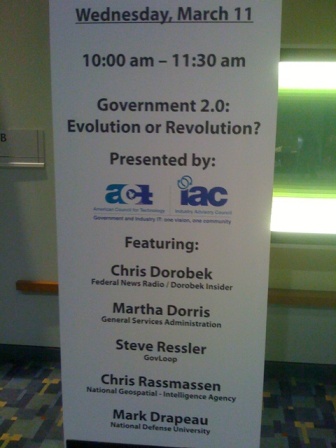ACT/IAC Government 2.0 panel: The liner notes — about middle age and centralization
The ACT-IAC government 2.0 panel today at FOSE As I have been mentioning, I have the opportunity to moderate a panel at the FOSE trade show on Wednesday titled...

The ACT-IAC government 2.0 panel today at FOSE
As I have been mentioning, I have the opportunity to moderate a panel at the FOSE trade show on Wednesday titled Government 2.0: Evolution or revolution.
I’ll be fascinated by how the discussion unfolds. It seems that there are several issues going on with this topic right now.
It comes at a time when the topic of government 2.0 is — the use of Web 2.0 tools — is beyond hot. In fact, it is so hot that O’Reilly Media has just announced they are going to host a Government 2.0 Summit in September. There are several reasons for that. Clearly, one is the election of Barack Obama as president. For people who have been laboring to get agencies to believe that these tools can help agencies accomplish their missions more effectively, there is now a White House that shares that belief.
But the real reason this issue is so hot right now is because these tools are… so easy to use … they enable collaboration in ways that have been only talk before … they enable people to tap into the concept that all of us are better then each of us individually … they bring to fruition what we all already knew: that information is power, but that information is even more powerful when it is shared.
And these tools have been growing so quickly — Mashable has reported that the number of Twitter users in 2008 grew by 752 percent. (I don’t see any real data behind this number, but…) Wired magazine editor Chris Anderson made mention of how the Twitter “fail whale” has become something of a cultural icon — there have been tatoos … and even a Fail Whale Fan Club. (An excellent write-up of Anderson’s presentation here.) And the March 2, 2009 issue of Fortune magazine, under the headline How Facebook is taking over our lives, notes that today there are more than 175 million Facebook users, and those people are sharing more information then ever before — even simple status updates. In February 2008, Facebook had 4 million status updates daily. One year later — February 2009 — there were more than 15 million daily. And people are spending more time onFacebook — Fortune reports that the average user is spending 169 minutes a month on the site, compared to the NewYorkTimes.com, which holds on to readers for 10 minutes per month.
All of this is influencing — some would undoubtedly argue infecting — how people do their work.
I have mentioned the fascinating conflict between government people keen on Web 2.0 vs the Web 2.0 people keen on government. That is perhaps most evident in how people view the evolution at the White House Web site.
But there is a growing chorus of people calling for these tools to be mandated, and for the White House or OMB come up with a way to coordinate the government’s efforts. Some — including two of the members on the ACT-IAC panel today — have suggested that government 2.0 initiatives are hitting middle age. And there was even a passing tweet that all CIOs should be required to use Twitter.
To be honest, I couldn’t disagree more. First, I don’t think the government 2.0 baby is even close to taking the first step — and those that have are icons. There is the remarkable Intellipedia… there is Navy CIO Rob Carey’s blog … there is almost anything done by NASA Goddard CIO Linda Cureton … there is TSA’s remarkable Idea Factory… there is the Alabama Department of Homeland Security’s Virtual Alabama … there is DC’s Apps for Democracy and its data repository … and the list goes on and on and one — and you can see many of those examples at the National Academy of Public Administration’s Collaboration Project.
There are many interesting and innovative things going on, but the government is just dipping its toe into the shallow end of the pool. There is so much more that can — and I believe will — be done. Those, however, are going to involve the ongoing evolution in thinking — and it is why on Friday the Federal News Radio Book Club will discuss Jeff Jarvis’s What Would Google Do? The book talks about giving up control — and there are few agencies that are willing to do that yet. [Listen to the Federal News Radio 1500 AM Book Club on Friday at 2p ET. All the details can be found here.]
Beyond that, all of these tools have to be focused on helping agencies accomplish their missions. If these tools prove to be better mouse traps, then use them. Demonstrate it. And be the evangelist for it. There are people who will resist — welcome to the real world — but in the end, the better mouse trap will win.
That being said, I’m not sure we’re ready to standardize on any specific tools. In my mind, there is still a lot of evolution yet to happen in this revolution. And there is plenty of time for mandates. Right now, there is too much innovation going on.
This afternoon on Federal News Radio 1500 AM’s Daily Debrief with Chris Dorobek and Amy Morris, we’ll talk about the session today… and I’ll report back here as well.
Copyright © 2025 Federal News Network. All rights reserved. This website is not intended for users located within the European Economic Area.





